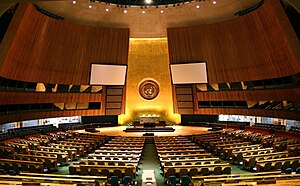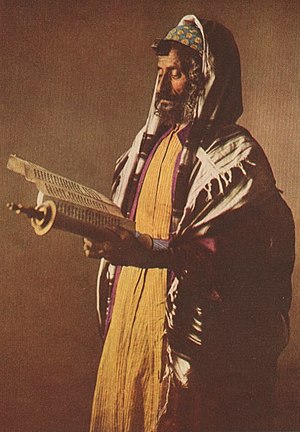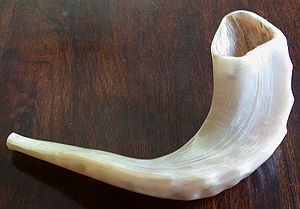 Image via Wikipedia//What we have to eat and pray
Image via Wikipedia//What we have to eat and prayWednesday 28 September 2011
The New Year!
 Image via Wikipedia//What we have to eat and pray
Image via Wikipedia//What we have to eat and prayMonday 26 September 2011
Academia at the beach
Sunday 25 September 2011
Bibi N. at the UN
 Image via Wikipedia//UN General Assembly isn't a friendly place for the state of Israel
Image via Wikipedia//UN General Assembly isn't a friendly place for the state of IsraelRelated articles
- The Man Behind Bibi (andrewsullivan.thedailybeast.com)
Saturday 24 September 2011
Sephardim in Bosnia
Browsing my bookshelf
 Image via Wikipedia//Give me a library and take me out in 100-year timeIt was the last Shabbat of the year, not too busy and with a lot of books around. Not all of them very good, but interesting enough to mention them shortly:
Image via Wikipedia//Give me a library and take me out in 100-year timeIt was the last Shabbat of the year, not too busy and with a lot of books around. Not all of them very good, but interesting enough to mention them shortly:On (better) praying
 Image via Wikipedia//A Yemenite Jew at the morning prayer
Image via Wikipedia//A Yemenite Jew at the morning prayerShabbat at the shul
Thursday 22 September 2011
Obama just checked at the UN
Rosh Hashanah 1944
Wednesday 21 September 2011
One year ago, one week before
 Image via Wikipedia//The blow of shofar will have a different meaning for me this year
Image via Wikipedia//The blow of shofar will have a different meaning for me this yearTuesday 20 September 2011
Monday 19 September 2011
Book Review: Academics against Israel and the Jews
Book Review: Creators and Disturbers. Reminiscences by Jewish Intellectuals of New York

Old Yiddish story
Sunday 18 September 2011
Bird-Shaped Challah Holds Special Holiday Meaning – Forward.com
Saturday 17 September 2011
Book Review: Messiah of Stockholm, by Cynthia Ozick

Book Review: Jews without Money
 Cover of Jews Without Money
Cover of Jews Without MoneyThursday 15 September 2011
Sports and Geopolitics - Maccabi Tel Aviv in Turkey
Related articles
- Maccabi Loses 5-1 (israelnationalnews.com)
- Maccabi Tel Aviv feels wrath of protesting Turkish fans (theglobeandmail.com)
- Turkey: Protest Outside Israeli Soccer Players' Hotel (israelnationalnews.com)
A trip to Neve Tzedek
Politics round-up and down and up and down...
Wednesday 14 September 2011
Book Review: Ladies Auxiliary, by Tova Mirvis

Tuesday 13 September 2011
Testimony: Molested children
The curse of discord
 Image via Wikipedia//Waiting for Yom Kippur
Image via Wikipedia//Waiting for Yom KippurMonday 12 September 2011
Book Review: The World to Come, by Dara Horn
The blessing of asher yatzar
Asher yatzar (Hebrew: "Who [has] formed [man(kind)]") is a blessing thanking G-d for the good functioning of the human body, included in many Jewish prayer books as a part of daily prayer prior to Birkat HaShachar.
Though recited normally by fully observant Jews are using the bathroom, but also recited during the Shacharit.
After leaving the restroom, the person washes their hands. According to Jewish etiquette, this should be done outside the bathroom, but if there is no source of water available outside the bathroom, it is permissible to wash one's hands inside the bathroom, and then dry them outside.
The blessing it’s mentioned in the Talmud (Berachot 60b) as one of the blessings compiled by the men of the Great Assembly.
Following the washing and drying of one's hands, the asher yatzar blessing is recited:
"Blessed are You, Hashem our G-d, King of the universe, Who formed man with wisdom and created within him many openings and many hollows. It is obvious and known before Your Throne of Glory that if even one of them ruptures, or if even one of them becomes blocked, it would be impossible to survive and to stand before You (even for a short period). Blessed are You, Hashem, Who heals all flesh and acts wondrously."
Source:
Sunday 11 September 2011
Remembering 9/11
Saturday 10 September 2011
Back in the news: two-three lines about the "spring"
Friday 9 September 2011
Manipulation of fears
FaceGlat vs. Facebook
Reading about Safed
 Image via Wikipedia//The citadel of Safed
Image via Wikipedia//The citadel of SafedThursday 8 September 2011
The importance of the Jewish names
Names are very important in Judaism, the Hebrew names being required for certain rituals and prayers, for calling to the Torah, for legal documents as the marriage contracts (ketubah). The Midrash (Genesis Raba 17:4) tells us that the first man, Adam, looked into the essence of every creature and named it accordingly and King David wrote in Psalms (147:4): "He counts the numbers of the stars; He gives a name to each of them."
Orthodox Jews and Israelis often give their children a Hebrew name, and that name is used for both daily and specifically religious purposes. Elsewhere it has become customary for Jewish parents to give their children two names - a secular name for use in the gentile world and a Hebrew name for religious purposes. Sometimes the secular name is an interpretation of the Hebrew name, like Jonah for Yonah and Eva for Chava. Similarly, the names might share meaning, like Justin and Daniel.
The Midrash (Bamidbar Raba 20:21) says that the Jewish people were redeemed from Egypt partly in the merit of having kept their Jewish names.
The Sages say that naming a baby is a statement of the character, specialness, and path in life, as at the beginning of life we are given a name, and at the end of life a "good name" is all we take with us. (Talmud - Brachot 7b; Arizal - Sha'ar HaGilgulim 24b) Talmud tells us that parents receive one-sixtieth of prophecy when picking a name: an angel comes to the parents and whispers the Jewish name that the new baby will embody. It is important to choose a name that will have a positive effect, since every time it is used the person is reminded of its meaning. (Midrash Tanchuma - Ha'Azinu 7)
Ashkenazi Jews have the custom of naming a child after a relative who has passed away. This keeps the name and memory alive, and in a metaphysical way forms a bond between the soul of the baby and the deceased relative. This is a great honor to the deceased, because its soul can achieve an elevation based on the good deeds of the namesake. The child, meanwhile, can be inspired by the good qualities of the deceased -- and make a deep connection to the past. (Noam Elimelech - Bamidbar) There are some reserves to use the name of a person who died at a young age, or suffered an unnatural death. The reluctance stems from the fear that the misfortune may, in a spiritual manner, be carried over to the new bearer of the name. If a person died a natural death and left children, this is not considered "bad fortune" which would preclude the use of the name. Both the prophet Samuel and King Solomon died at the "young" age of 52, yet traditionally their names have always been used by Jews.
Sephardi Jews name children after relatives who are still alive. This source is from the Talmud, which records a child named after Rabbi Natan while he was still alive (Shabbat 134a).
Some customarily choose a name based on the Jewish holiday coinciding with the birth. For example, a baby born at Purim-time might be named Esther or Mordechai. A girl born on Shavuot might be named Ruth, and a child born on Tisha B'Av, the Jewish day of mourning, might be named Menachem or Nechamah.
Similarly, names are sometimes chosen from the Torah portion corresponding to the week of the birth. Many names and events are mentioned in each Torah portion, offering a spiritual connection between the baby and that particular biblical figure.
Contrary to popular perception, it is not forbidden to announce the name of a baby before his Bris. In a metaphysical sense, however, the child does not actually "receive" his name until the Bris. This is based on the fact that G-d changed Abraham's name in conjunction with his Bris -- at age 99 (Genesis 17:15). Also, the boy only receives the full measure of his soul at the Bris, and a person cannot truly be "named" until attaining that completion. (Zohar - Lech Lecha 93a, Ta'amei Minhagim 929)
Sources:
R' Cordovero on meditation and prayer
Wednesday 7 September 2011
Book Review: Tough Jews
EcoNegev takes 7 visiting jou... JPost - Environment & Technology
The mitzvot of wearing Tzitzit
 Image via Wikipedia//Blue and white is the Sephardic style
Image via Wikipedia//Blue and white is the Sephardic styleTzitzit are attached to the four corners of the tallit (prayer shawl) and tallit khatan.
Wearing tzitzit is a biblical commandment. The Torah states in Numbers 15:38: "Speak to the children of Israel, and say to them, that they shall make themselves fringes on the corners of their garments throughout their generations, and they shall put on the corner fringe a blue (tekhelet) thread”. Wearing the tzitzit is also commanded in Deuteronomy 22:12: "You shall make yourself twisted threads, on the four corners of your garment with which you cover yourself." Once a boy is old enough to understand how to wear tzitzit, meaning to keep two corners of the garment in front and two behind, and to hold the strings when reciting Shema, we are obligated to acquire a pair of tzitzit for him, and train him.(Shulchan Aruch Orach Chaim 17:3) In addition, it serves as a reminder of the Exodus from Egypt (Numbers 15:40). The Talmud equates its observance with that of all the mitzvot. Rambam (Pirkei Avot 2:1) includes it as a major mitzvah along with brit milah.
The fringe on each corner is made of five strands, each of which is made of eight fine threads (known as kaful shemoneh). The five strands are passed through a hole (or according to some: two holes) 1-2 inches (25 to 50 mm) away from the corner of the cloth. There are numerous customs as to how to tie the fringe. The Talmud explains that the Bible requires an upper knot (kesher elyon) and one wrapping of three winds (hulya). The Talmud enjoined that between 7 to 13 hulyot be tied, and that "one must start and end with the color of the garment." As for the making of knots in between the hulyot, the Talmud is inconclusive, and as such poskim have varyingly interpreted this requirement. The Talmud described tying assuming the use of tekhelet dye, however, following the loss of the source of the dye, various customs of tying were introduced to compensate for the lack of this primary element.
Though many methods exist, the one that gained the widest acceptance can be described as follows:
The five strands of the tzitzit are passed through holes near the four corners of the garment (Shulchan Aruch Orach Chaim 11:9-11,15) that are farthest apart (10:1). Four tzitzyot are passed through each hole (11:12-13), and the two groups of four ends are double-knotted to each other at the edge of the garment near the hole (11:14,15). One of the tzitzit is made longer than the others (11:4); the long end of that one is wound around the other seven ends and double-knotted; this is done repeatedly so as to make a total of five double knots separated by four sections of winding, with a total length of at least four inches, leaving free-hanging ends that are twice that long (11:14).
Before tying begins, a Hebrew blessing is said (it's more of a "declaration of intent"): L'Shem Mitzvat Tzitzit (For the sake of the commandment of tzitzit).
The two sets of stands are knotted together twice, and then the shamash (a longer strand) is wound around the remaining seven strands a number of times . The two sets are then knotted again twice. This procedure is repeated three times, such that there are a total of five knots, the four intervening spaces being taken up by windings numbering 7-8-11-13, respectively. The total number of winds comes to 39, which is the same number of winds if one were to tie according to the Talmud's instruction of 13 hulyot of 3 winds each. Furthermore, the number 39 is found to be significant in that it is the gematria (numerical equivalent) of the words: "G-d is One" Deuteronomy 6:4). Others, especially Sephardi Jews, use 10-5-6-5 as the number of windings, a combination that represents directly the spelling of the Tetragrammaton (one of G-d's names).
Rashi bases the number of knots on a gematria: the word tzitzit (in its Mishnaic spelling) has the value 600. Each tassel has eight threads (when doubled over) and five sets of knots, totalling 13. The sum of all numbers is 613, traditionally the number of mitzvot. This reflects the concept that donning a garment with tzitzyot reminds its wearer of commandments. Nachmanides disagrees with Rashi, pointing out that the Biblical spelling of the word tzitzit has only one yod rather than two (giving it a gematria of 590 plus 13), thus adding up to the total number of 603 rather than 613. He points out that in the Biblical quote "you shall see it and remember them", the singular form "it" can refer only to the "p'til" ("thread") of tekhelet. The tekhelet strand serves this purpose, explains the Talmud, for the blue color of tekhelet resembles the ocean, which in turn resembles the sky, which in turn is said to resemble God's holy throne - thus reminding all of the divine mission to fulfill His commandments.
Colours
Tekhelet (תכלת) is color dye which the Hebrew Bible commands the Jews to use for one, two, or four of the eight half-strings hanging down. At some point in Jewish history, the source of the dye was lost and since then, Jews have worn plain white tzitzyot without any dyes. Tekhelet, which appears 48 times in the Tanakh is a specific blue dye produced from a creature referred to as a chilazon, other blue dyes being unacceptable (Tosefta). Some explain the black stripes found on many traditional prayer shawls as representing the loss of this dye.
Where tekhelet is used, only one thread in each fringe is dyed with it, the rest being left white or self-coloured. The dyed thread is always made of wool, regardless of the material of the garment or the other threads.
The other threads in the tzitzit (all the threads, where tekhelet is not used) are described as "white". This may be interpreted either literally (by Rama) or as meaning the same colour as the main garment (Rambam). Normally, the garment itself is white so that the divergence does not arise.
Similarly the threads may be made either of wool or of the same fabric as the garment; again many authorities recommend using a woollen garment so that all views are satisfied.
Book Review: Limassol
The future of the Jewish media?
Tuesday 6 September 2011
Book Review: Once upon a shtetl

Two Israeli universities in the top 200 QS World University Rankings
Monday 5 September 2011
40 Israelis detained, questioned ... JPost - Diplomacy & Politics
Sunday 4 September 2011
Book review: Running away the temptation: The Fugitive
Book review: The rise of David Levinsky
















 Zemanta" style="border:none;float:right">
Zemanta" style="border:none;float:right">










